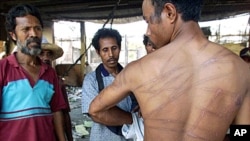A report by a Jakarta legal aid group says Indonesian police and prison officials routinely and systematically torture prisoners. The report is based on extensive interviews with prisoners, police, judges and human rights activists.
Restaria Hutabarat, with the Jakarta Legal Aid Institute, spent the past year leading an investigation into the prevalence of torture in prisons in four major Indonesian cities. What she found was that beatings, intimidation and even rape are so commonplace that they are considered the norm.
"We concluded that torture is systematic and integrated within the criminal justice system because every respondent that we surveyed said that they experienced at least one form of torture through the criminal justice system," Hutabarat stated.
The finding was based on interviews with over 1,000 suspects and prison inmates as well as responses from 400 police officers, prosecutors, judges, wardens and rights activists.
Hutabarat says police for the most part are the perpetrators of torture, often to obtain confessions. But she says prosecutors and judges are complacent in either encouraging or condoning the use of force in interrogations.
Hutabarat says police have too much authority over suspects and too little accountability. In some cases police can detain suspects up to 60 days before charging them. And she says, in Indonesia torture committed by police is not considered a crime, and that needs to change.
"The government should define torture as a crime in Indonesia, according to the law," she said. "There must be the existing law defined by the government to criminalize the perpetrators of torture. That is the first and most urgent step, should be done."
Indonesia, a nation of 237 million people, emerged from decades of dictatorship in 1998. Though the country has become a democracy, it is still criticized for having a weak legal system.
There also have been reports of soldiers torturing suspected separatists, and the army says it has court-martialed several suspects.
The National Police spokesman says the agency will study the report and that any officers who abuse civilians should face sanctions.
Indonesian Police Accused of Systematic Torture of Prisoners
